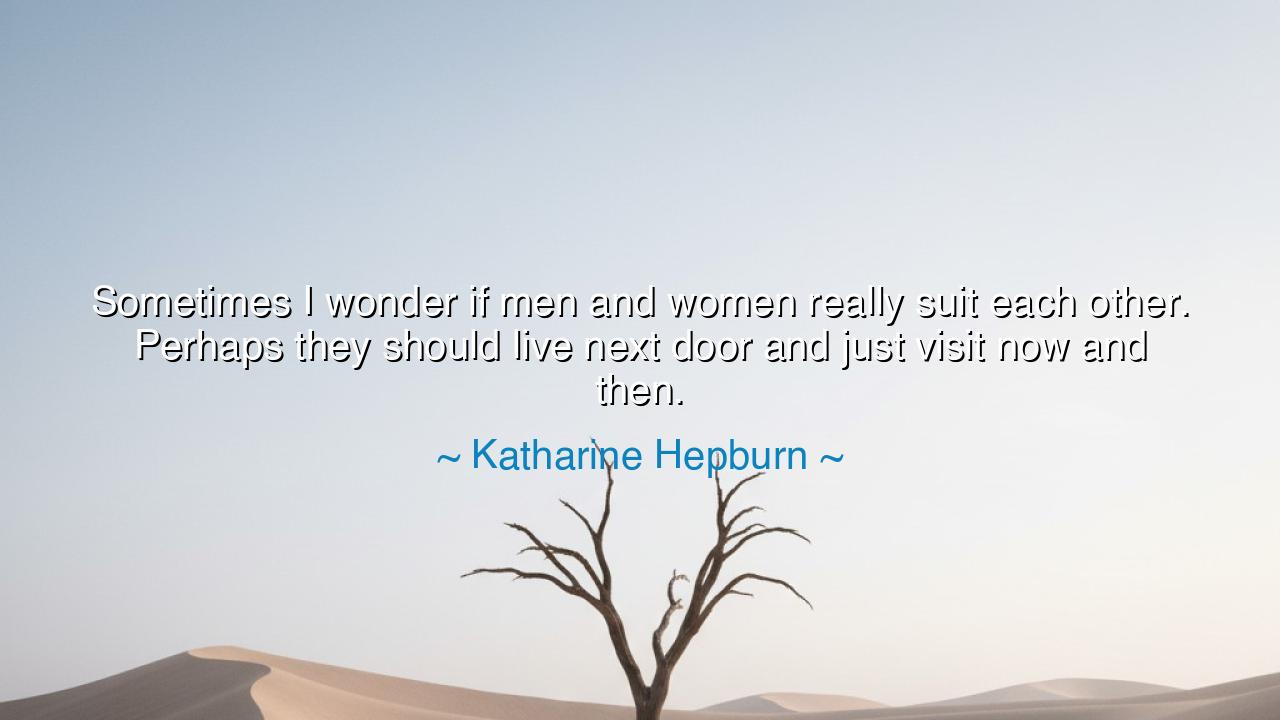
Sometimes I wonder if men and women really suit each other.
Sometimes I wonder if men and women really suit each other. Perhaps they should live next door and just visit now and then.






"Sometimes I wonder if men and women really suit each other. Perhaps they should live next door and just visit now and then." These words, spoken by the legendary actress Katharine Hepburn, reflect a profound reflection on the nature of relationships between men and women. With her characteristic wit and sharp insight, Hepburn raises a question that has echoed through the corridors of time: do men and women truly fit together as partners, or is their connection more like that of two separate forces that can only meet in brief, fleeting moments? Her words carry within them a deep truth about the balance between independence and intimacy, and the tension that often arises when two people with vastly different natures are expected to coexist in harmony.
In the ancient world, the relationship between the masculine and the feminine was often depicted as a cosmic balance. The Greeks, for example, celebrated Artemis, the goddess of the hunt, as a symbol of independence and the untamed wild, while Aphrodite represented the love and connection that bind individuals together. These two powerful deities, while both essential to life, represented very different aspects of existence. The Greeks understood that the male and female energies, though complementary, often pulled in different directions—one towards the outer world of action and independence, the other towards the inner world of emotional connection and intimacy. It is this eternal dance of balance between opposites that Hepburn, in her humorous yet insightful way, seems to comment on.
Consider the great Roman philosopher Seneca, who wrote extensively on the complexities of relationships. For him, the ideal relationship was one that maintained autonomy while also fostering mutual respect and understanding. In his writings, he cautioned against the entanglements that could arise when two individuals became too dependent on one another, and suggested that the best partnerships were those in which each person was able to maintain their own inner strength and individuality. Seneca’s reflections mirror Hepburn’s playful suggestion that perhaps men and women should not be forced into perpetual proximity, but allowed to exist side by side, each in their own space, able to come together only when truly desired, free of the weight of constant expectation.
There is a certain wisdom in Hepburn’s musings, as they call attention to the need for space in relationships. History is full of examples where co-dependence—the idea that two people must be in constant proximity, always intertwined—has led to unnecessary strain. The story of Cleopatra and Julius Caesar, for example, is one of great political and personal intrigue, but their partnership was fraught with complications and turbulence. Though they ruled side by side, their constant closeness led to conflicts that ultimately contributed to their downfalls. Cleopatra’s power was diminished by the overwhelming presence of her need to maintain her relationship with Caesar, and Caesar’s political decisions were often clouded by his personal entanglements. Their relationship shows us the danger of not allowing room for individuality to flourish within a partnership.
In contrast, the story of Queen Elizabeth I of England offers a striking example of the benefits of maintaining independence within a leadership role. Elizabeth, often called the Virgin Queen, chose to never marry, despite the political and personal pressures to do so. By keeping her own space, both physically and metaphorically, Elizabeth was able to maintain her focus, her sovereignty, and her ability to lead effectively without the constraints that a traditional relationship might have imposed. Her reign, long and prosperous, is often seen as a model of how one can balance strength and leadership without sacrificing personal autonomy for the sake of emotional or relational attachments.
Hepburn’s words also speak to the changing dynamics of modern relationships, particularly in the context of personal fulfillment. In today’s world, there is an increasing recognition that independence is as essential as connection. The old model of the all-encompassing partnership—one in which each partner is expected to sacrifice their individual identity for the sake of the relationship—can often lead to frustration and resentment. Instead, many have found greater happiness by embracing space in relationships, giving each person the room to grow and flourish on their own terms, and coming together only when it is a mutual choice. This modern understanding of relationships is not about distance in the emotional sense, but rather the freedom to maintain selfhood while still being deeply connected.
The lesson that Hepburn imparts is one of balance. While relationships can be beautiful and full of joy, they must not come at the cost of personal freedom and self-expression. To love someone does not mean to lose oneself in the process; rather, it is to come together in mutual respect and admiration, each person retaining the right to their own space and individuality. Like the ancient philosophers, who believed in the necessity of both independence and connection, we must strive to create relationships where both people can be free and whole in themselves, yet still share moments of love and understanding when they choose.
Thus, as you walk through your own relationships, remember this lesson: balance is the key. Allow space for both independence and connection. Let each person breathe, grow, and thrive as individuals, and when the time is right, come together in a meeting of hearts and minds. Don’t rush to define love through constant proximity or expectation. Instead, create the space where both partners can feel free, and in doing so, you will create a relationship that is based on choice, respect, and mutual growth. Like the great thinkers of old, let us embrace the tension between freedom and togetherness, and in doing so, create relationships that are more profound, more lasting, and more meaningful.






AAdministratorAdministrator
Welcome, honored guests. Please leave a comment, we will respond soon